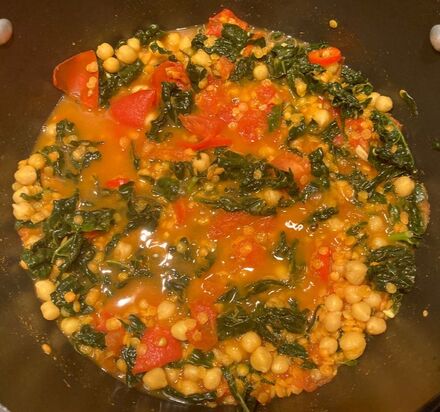|
I’m Neil Young, an exercise and healthy lifestyles specialist based in the Surrey Hills. Right now I’m working with For Earth’s Sake to bring some of the shop produce to life with delicious recipes that you can source entirely in store. I’m also adding on nutritional info and insights on the key ingredients. It’s January and these days that means that it’s Veganuary Season! For the last few years 100,000s of people have given up, or cut down on, meat, fish, and dairy for a month and switched to a plant-based, vegan diet. They might be doing this because they have heard that it is better for their health (it really is!), that livestock and dairy farming are responsible for more greenhouse gas emissions than all of the world’s transportation combined (they are!), or they are concerned about animal welfare (who wouldn’t be, right?). It has become a month when restaurants offer Veganuary menus and supermarkets push their plant-based meat alternatives. Familiar brands like Greggs, Ginsters, and Pukka Pies now have vegan versions of their popular products. These particular meat alternatives are good news for environmental sustainability and animal welfare, but, being calorie rich and nutrient poor, they’re not great for our health. Therefore, to help people to step into Veganuary in a healthy way, I am going to focus on a whole foods plant-based meal that is high in protein and contains a vast variety of the vitamins and minerals that you can only get from eating several different vegetables in the same dish. It’s a vegetable masala and, before we get to the recipe, I’m going to tackle the most common question that vegans are asked about their diet; where do you get your protein from? As well as being the most oft-asked question of people who follow a plant-based or vegan diet, it's also the one that irritates them the most! Why? Well, there are two common misconceptions about dietary protein. Firstly, the food industry would have us believe that we all need to eat more protein and they are adding protein to all sorts of products and passing them off as health foods (protein-enriched Mars Bar, anyone?). The truth of the matter is that most people eat more than the required amount of protein every day. In the UK the daily reference nutrient intake for protein is 0.75g per kg of body weight, which works out as 56g/day and 45g/day for men and women of average build, respectively. The actual average daily intake of dietary protein is 88g for men and 64g for women. The UK population is not protein deficient. The second misconception is that plant foods themselves don’t contain enough protein when compared to meat and dairy. While it’s true that meat, fish, eggs, and dairy products are higher in protein concentration than plant foods, plants do contain protein (where do you think cows get their protein from?), but they don’t have the high levels of saturated fats and cholesterol found in meat and dairy. That makes them a much healthier choice. Here are some of the most protein-dense examples of whole plant foods: Tempeh • Lentils • Edamame / Soybeans • Black Beans Tofu • Chickpeas* • Peas* • Hemp Seeds Peanut Butter* • Quinoa • Potatoes* • Almonds Rolled Oats • Broccoli* • Kale* • Kidney Beans * Featured in my vegetable masala recipe We can therefore meet all of our protein needs by eating plants, but there is one more thing to bear in mind - we should eat a wide variety of them. This is because protein is made from different combinations of amino acids, some of which can be produced in the body and some which can’t and have to be sourced from our diet. The ones which we have to get from our food are known as essential amino acids and there are 9 of them. Different plants contain different essential amino acids and no plant contains them all. To make sure that we are eating all 9 across the week we need to eat lots of different vegetables, grains, legumes, nuts, and seeds.  You can find out more about Neil Young and Healthy Life Neil by visiting healthylifeneil.co.uk or following Neil on Instagram @healthylifeneil. Vegetable Masala This recipe makes 6 servings. Ingredients
Method
Shopping List
1 Comment
24/7/2021 01:27:13 am
Amazing blog, I'm very happy to read this blog. Basically, I know new many things to read this blog. I strongly believe that the blog delivers the best information to its audience.
Reply
Leave a Reply. |
Archives
January 2024
Categories
All
|

